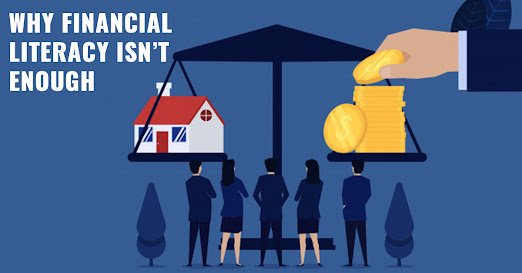Why Financial Literacy Isn’t Enough
At its core, financial literacy is all about understanding money. People who’re financially literate understand how to make use of money and to save money for their own economic gain.
Though this may look to be a straightforward concept, financial literacy falls short in endorsing the kind of healthy spending habits people need. Here, we have explained why financial literacy is not enough
Financial literacy does not encourage:
The major issue with financial literacy is that it falls short to consider one’s financial or personal circumstance. Due to this, it can’t encourage people to make smarter spending choices.
Learning to encourage individuals to make healthier financial decisions will need a dynamic approach. This approach should look to increase financial knowledge while giving access to equal resources for all individuals. Just as importantly, however, it should ensure that those experiencing poverty understand that an economical use of the resources given can change their financial condition.
Most financial literacy programs are not targeted towards the appropriate audience:
Many studies have been published in the past few years suggesting that experimental and just-in-time education efforts are more impactful. This is because typical financial literacy subjects like income taxes and mortgage loans are not applicable to students now or in the coming ten years in some cases.
If a person is incapable of connecting their knowledge with action, then having the knowledge doesn’t serve them. What is missing is the tools and education required to demonstrate people how to connect this information with their future selves. When a person builds up the skills to see the future benefits of financial literacy, they’re better equipped to take action today.
Financially literacy does not address structural issues:
Learning about the significance of your credit score, how to budget and learning about interest rates should not be knocked off. Having a strong insight of those areas can help improve one’s financial situation, however, in an environment where the cost of housing, medical expenses, housing and child care are increasing while wages are flat, financial literacy can only alleviate so much.
Conclusion:
For Canadians to improve their financial literacy and engagement, the financial industry needs to do a better job at building faith and connection by addressing the complex emotions, fears, and uncertainties that so many of us have regarding money. The responsibility is on the financial institutions to be more responsive to their clients. Still, you can start to affect the change for yourself by considering financial planners and services that rate highly in regards of responsiveness, trust, and respect alongside their credentials and expertise.
Disclaimer: The information in this commentary is for informational purposes only and not meant to be personalized investment advice. Please contact your investment professional for investment advice and before investing in any product. ACPI does not publish market research and Sunil Chugh is not registered as a research analyst. The content is from sources believed to be accurate and the opinions expressed are those of the author and do not necessarily represent those of ACPI





nice
ReplyDeleteThis article provides an insightful exploration of the evolution of technology in Canadian higher education, with a focus that extends beyond wealth management beyond wealth management. The author adeptly highlights key advancements and their impact on academic institutions. It is commendable to see such an in-depth examination of such an important aspect of education, which offers valuable perspectives for teachers and policy makers.
ReplyDelete